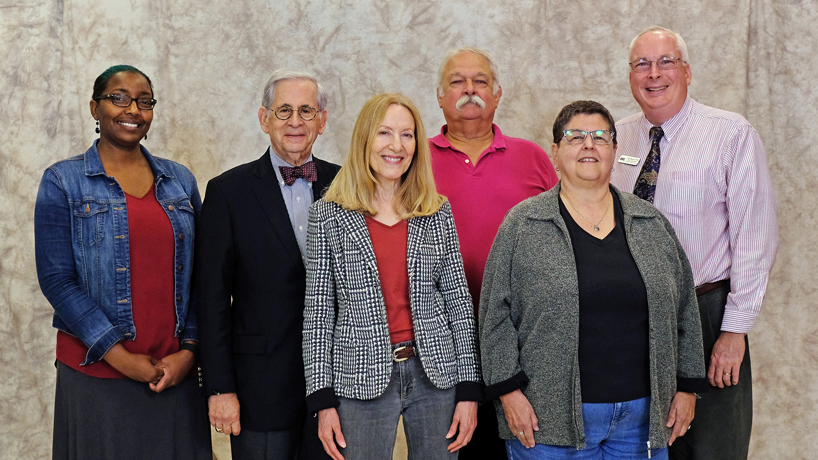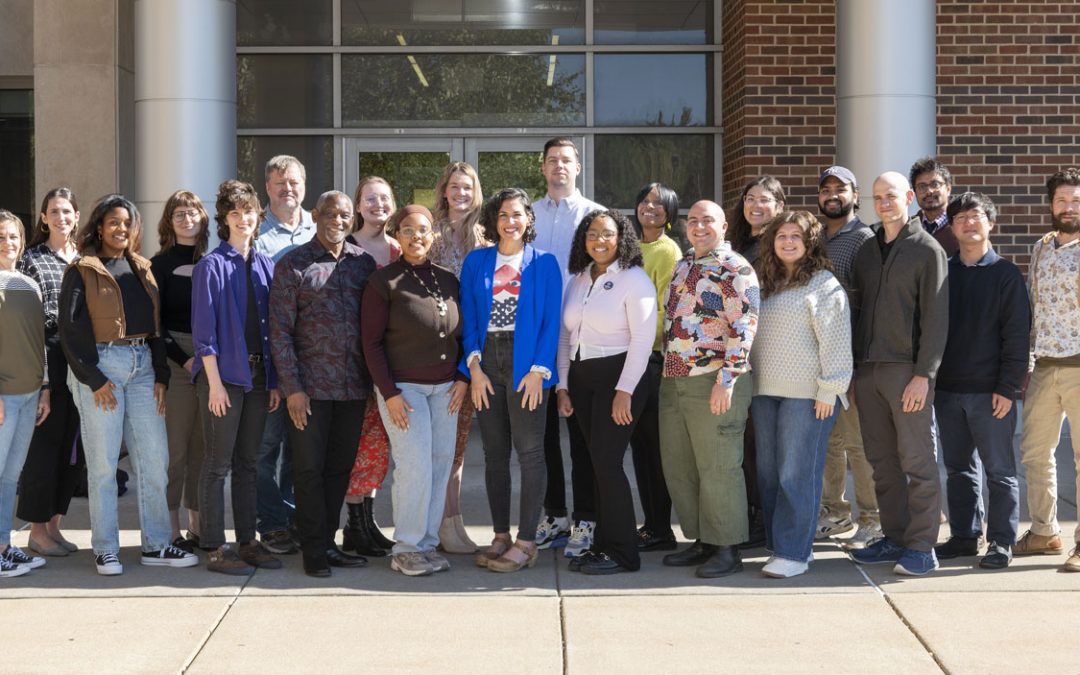
Several of the first people to be accepted into UMSL’s soon-to-launch Senior Scholars Program – Howard Kaplansky (second from left), Lynn Goode (center) and Christine Hummel (second from right) – pause for a portrait during a conversation about their interest in the pilot alongside graduate assistant Brianne Overton (at left), St. Louis County’s Mike Nickel (center back) and Tom Meuser, director of UMSL’s gerontology program. (Photo by August Jennewein)
On Tuesday, Christine Hummel retired from her day job. In January, she’ll attend an orientation day at the University of Missouri–St. Louis and head off to class.
Confused? Don’t be: The 65-year-old is hardly alone. In the few weeks since the College of Arts and Sciences announced the spring 2018 launch of its Senior Scholars Program, nine other local seniors have also applied and been accepted to take part in the pilot initiative, with more to come.
As Professor Tom Meuser, director of UMSL’s gerontology program, describes it, the concept builds on the kind of diversity that the land-grant institution already emphasizes, taking UMSL’s commitment to educating the regional community to a new level.
“This is part of a larger international effort that started at Dublin City University in 2012 called the age-friendly university,” Meuser explains. “Part of that involves seniors being fully integrated into university life, and that’s kind of where I’m headed with this.”
While seniors like Hummel have been able to audit college courses at low cost ever since Missouri passed a law in 1998 requiring as much of state-funded institutions, such participation tends to be rare. That’s partly been due to the fact that interested parties must wait until the day before a semester begins to potentially sign up – and at that point all the seats in a given course, particularly popular ones, are often taken.
Meuser is working with colleagues across the university to fix that issue as well as add a network of support and opportunities for shared learning among each Senior Scholars cohort going forward. To hear Hummel and some of her fellow soon-to-be UMSL classmates tell it, he’s on the right track.
During the application process, seniors view a select list of undergraduate classes ahead of time and rank those courses that they’re most interested in taking. Hummel’s top pick for next semester is Anthropology 1034: Introduction to Ancient Egypt, and Meuser has already been able to assure her a spot.
“Egyptology was my No. 1 choice, because that’s long been a passion of mine,” Hummel says. “And now, being retired, I’m really looking forward to being able to concentrate on the class as much as I want to rather than only being able to concentrate on it for so-much percent because I have to work. I hope to do well because I want to.”
Meanwhile, Howard Kaplansky, 75, has his eye on Philosophy 1180: Science vs. God among other offerings. A teacher himself at Eden Theological Seminary, where he serves in an adjunct capacity, he’s also the rabbi emeritus of United Hebrew Congregation, the oldest Jewish congregation west of the Mississippi River.
“It’s 180 years old – I’m not the original rabbi,” Kaplansky deadpans. “But I’ve kind of aged with my congregation, and I really see the value, the great value, in the stimulation of learning. My favorite book of the Bible is Ecclesiastes – ‘For everything there is a season’ and a time for every experience.
“Over the years we’ve seen that the little niches that we were put in at certain ages really don’t apply any longer. For me this is a season of a new kind of learning, and through this program I’d like to bring the benefit of that to others, too.”
Meuser notes that, like all UMSL students, the SSP participants will come to campus for all sorts of reasons and with their own individual goals in mind. That’s as it should be in his view – and speaks to the inherent possibilities of the new program from an institutional perspective as well.
“Aging has really changed a lot, and the idea of 65 as the age of retirement comes from a German monarch 100 years ago,” he says, pointing out that the second-fastest-growing population group within the U.S. is above the age of 85. “I see the doors of possibility opening for new learning with SSP, but I also see it for new career paths for some people who may say, ‘You know what, I not only want to learn about this, I want to pursue a degree.’
“We have 50,000 centenarians in the United States today – amazing. Part of that is obviously that we’re living longer and taking care of our health. The other big trend in aging right now is the idea of an encore career.”
For Lynn Goode, 66, it’s not about a new career. She retired in 2010 from the Parkway School District, where she taught first grade for decades.
“I put so much passion into teaching first grade that when I did retire, I wasn’t ready to ‘refire’ with another career, and I did not want to make another penny,” Goode says. “But I also put so much into teaching that I didn’t have a lot of time to volunteer. And I really appreciated the volunteers in my classroom, and that’s what my life’s about now – giving back.”
It’s also about lifelong learning, she adds.
“My motivation, really, is that I want to continue learning throughout my life,” Goode explains. “I always have, and I think I always will. And UMSL is an esteemed place in St. Louis, and I’ve never been a part of it in an academic way. That’s exciting to me, and it’s really fun to be at the ground floor of something that I think is really a good idea. I’m really proud and pleased that the university is doing this.”
The faculty members partnering with Meuser to get the program rolling have been eager to help as have his graduate assistants, including Brianne Overton, a thanatologist and grief counselor currently pursuing a doctorate in counseling at UMSL.
She’s already proven a resource even with the official beginning of the pilot initiative still two months out, whether it’s helping members of the inaugural SSP cohort find their way across the 470-acre campus or figure out some aspect of university technology.
“I actually help Tom with lots of different programs and projects, and so whatever he sends my way I’ll be happy to help with,” Overton says. “But from the marketing to being of assistance and help to the seniors in the program and the people who will be here on campus, I’m glad to be that person you can call or email about whatever is happening.”
Meuser, who earlier this fall was appointed to St. Louis County’s Older Adult Commission, has been in contact with colleagues in a range of disciplines and roles at UMSL during planning. He’s been pleasantly surprised at the way people are quick to embrace the SSP idea, which is the first piece of a broader Community Scholars Program in the works.
Time and again, as he has asked for help guaranteeing seats in various courses he hopes to offer as part of the program, faculty members readily say yes.
“What’s been so fun about this is that, just even starting to talk about it, they say, ‘I want my class included on your list. I love having seniors in my class. I want the added conversation value of someone with more experience.’ So this has not been hard,” Meuser says. “Sometimes in a university environment it can be hard to do new things. But this one has been pleasantly easy.”
He’s also found eager partners at the county level, including Mike Nickel, a 1976 UMSL alumnus who is the support services supervisor for the County Older Residents Programs, which has partnered with the university on a number of initiatives in the past.
Nickel frequently gives presentations around the region as part of CORPS’s Age Smart Age Well initiative, and he plans to talk up SSP in that context wherever he can.
“I see that as a real place to promote the UMSL program,” Nickel says. “We can definitely help get the word out and do a good job of just helping spread the word about how valuable this is.”
He adds that while it’s called the Senior Scholars Program, the direct result of it is really an intergenerational experience.
“Mature students bring a different perspective – as much because of what they know as what they have lived,” Nickel says. “It’s always great to make use of those folks, from an instructor’s point of view, really to help illuminate points and really share their experiences with the class.”
Goode and other participants in the pilot are just as excited to learn from people all across the age spectrum.
“I agree with that intergenerational piece,” Goode says. “When I first started teaching, I was young, and many staff members had lots more experience than me. I wanted to hang out with and learn from people close to my age because that’s what I’d been doing most of my life. That changed quickly as I realized how incredibly wealthy the school was because it had a staff of different ages and experience levels.
“Now I’m on the other age end. If I can be of value to younger students and also learn from them, that would be really satisfying and exciting.”
For more information about SSP, visit the program website.















